四川省威远中学2019届高三英语上学期第二次月考试题2019013001177
[精品]2019届高三英语上学期第二次月考试题新人教版新版
![[精品]2019届高三英语上学期第二次月考试题新人教版新版](https://img.taocdn.com/s3/m/ba748d246c85ec3a87c2c56a.png)
2019届第一学期第二次月考高三年级·英语试卷考试时间:120分钟总分:150分第一卷(三部分,共115分)第一部分听力(共两节,满分30分)第一节(共5小题;每小题1.5分,满分7.5分)听下面5段对话。
每段对话后有一个小题,从题中所给的A、B、C三个选项中选出最佳选项,并标在试卷的相应位置。
听完每段对话后,你都有10秒钟的时间来回答有关小题和阅读下一小题。
每段对话仅读一遍。
1. What does the man think of Ben Brown’s latest novel?A. Interesting.B. Boring.C. Confusing2. What does the man ask the woman to do?A. Come home early B Be quiet when coming homeC. Go to bed early3. What will the man probably do tonight?A. Go to a movie. B Put on a show C. Watch a firework show4. How does the woman probably feel now?A. InterestedB. ConfusedC. Exhausted5. Why is the man moving?A. He needs a quieter placeB. He wants to live aloneC .The present one is too expensive.第二节(共15小题;每小题1.5分,满分22.5分)听下面5段对话或独白。
每段对话或独白后有几个小题,从题中所给的A、B、C三个选项中选出最佳选项,并标在试卷的相应位置,听每段对话或独白前,你将有时间阅读各个小题。
每小题5秒钟;听完后,各小题给出5秒钟的作答时间。
四川省内江市威远县2019届高三英语上学期9月月考试题
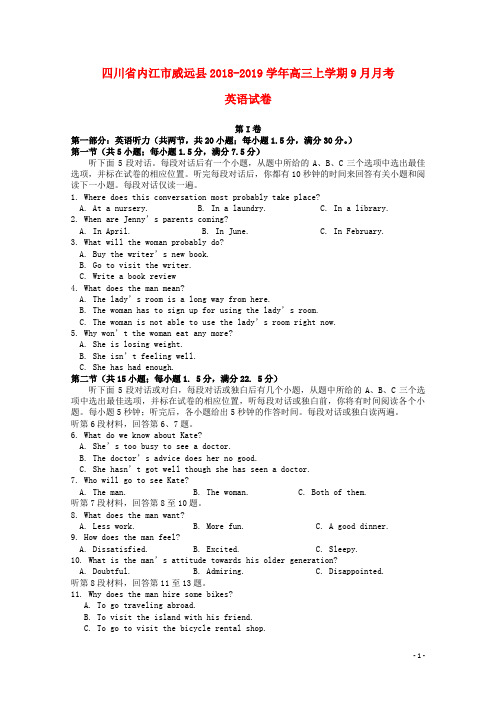
四川省内江市威远县2018-2019学年高三上学期9月月考英语试卷第I卷第一部分:英语听力(共两节,共20小题;每小题1.5分,满分30分。
)第一节(共5小题;每小题1.5分,满分7.5分)听下面5段对话。
每段对话后有一个小题,从题中所给的A、B、C三个选项中选出最佳选项,并标在试卷的相应位置。
听完每段对话后,你都有10秒钟的时间来回答有关小题和阅读下一小题。
每段对话仅读一遍。
1. Where does this conversation most probably take place?A. At a nursery.B. In a laundry.C. In a library.2. When are Jenny’s parents coming?A. In April.B. In June.C. In February.3. What will the woman probably do?A. Buy the writer’s new book.B. Go to visit the writer.C. Write a book review4. What does the man mean?A. The lady’s room is a long way from here.B. The woman has to sign up for using the lady’s room.C. The woman is not able to use the lady’s room right now.5. Why won’t the woman eat any more?A. She is losing weight.B. She isn’t feeling well.C. She has had enough.第二节(共15小题;每小题1. 5分,满分22. 5分)听下面5段对话或对白,每段对话或独白后有几个小题,从题中所给的A、B、C三个选项中选出最佳选项,并标在试卷的相应位置,听每段对话或独白前,你将有时间阅读各个小题。
四川省威远中学2019届高三上学期第一次月考 英语
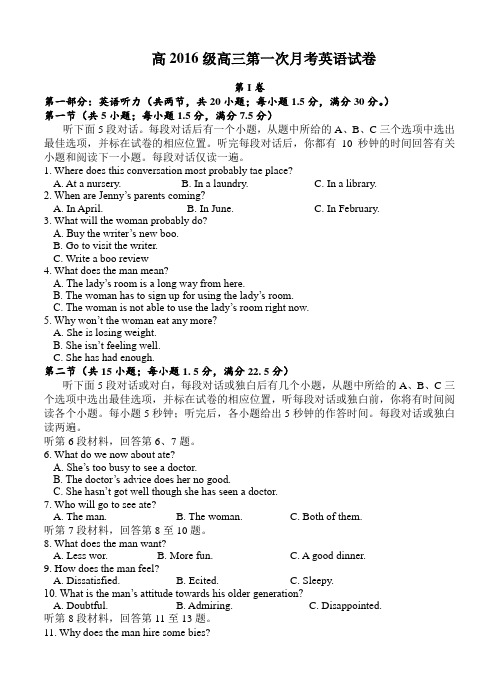
高2016级高三第一次月考英语试卷第I卷第一部分:英语听力(共两节,共20小题;每小题1.5分,满分30分。
)第一节(共5小题;每小题1.5分,满分7.5分)听下面5段对话。
每段对话后有一个小题,从题中所给的A、B、C三个选项中选出最佳选项,并标在试卷的相应位置。
听完每段对话后,你都有10秒钟的时间回答有关小题和阅读下一小题。
每段对话仅读一遍。
1. Where does this conversation most probably tae place?A. At a nursery.B. In a laundry.C. In a library.2. When are Jenny’s parents coming?A. In April.B. In June.C. In February.3. What will the woman probably do?A. Buy the writer’s new boo.B. Go to visit the writer.C. Write a boo review4. What does the man mean?A. The lady’s room is a long way from here.B. The woman has to sign up for using the lady’s room.C. The woman is not able to use the lady’s room right now.5. Why won’t the woman eat any more?A. She is losing weight.B. She isn’t feeling well.C. She has had enough.第二节(共15小题;每小题1. 5分,满分22. 5分)听下面5段对话或对白,每段对话或独白后有几个小题,从题中所给的A、B、C三个选项中选出最佳选项,并标在试卷的相应位置,听每段对话或独白前,你将有时间阅读各个小题。
2019届四川省威远中学高三12月月考英语试卷与答案

2019届威远中学高三第三次月考英语试卷第一部分:听力(共两节,满分30分)第一节(共5小题;每小题1.5分,满分7.5分)请听下面5段对话,选出最佳选项。
1. What does the man want to do?A. Wash the clothes.B. Dry the dishes.C. Water the plants.2. How does the woman probably feel now?A. Stressed.B. Shocked.C. Exhausted.3. What's the weather like in the mountains?A. Snowy.B. Sunny.C. Cloudy.4. What are the speakers talking about?A.A fan.B.A person.C.A castle.5. What does the woman's father do?A.A driver.B.A mechanic.C.A salesman.第二节(共15小题;每小题1.5分,满分22.5分)请听下面5段对话或独白,选出最佳选项。
请听第6段材料,回答第6、7题。
6. What is the woman sending to her sister?A. Fruits.B. Candies.C. Vegetables.7. What day is it today probably?A. Tuesday.B. Thursday.C. Saturday.请听第7段材料,回答第8、9题。
8. What does the woman say about the X-K Opus?A. It is not available now.B. It is not on sale.C. It is not the latest.9. What type of computer does the man prefer to buy?A. The X-R Opus.B. The X-H Opus.C. The X-K Opus.请听第8段材料,回答第10至12题。
2019-2020学年威远中学高三英语月考试题及答案解析
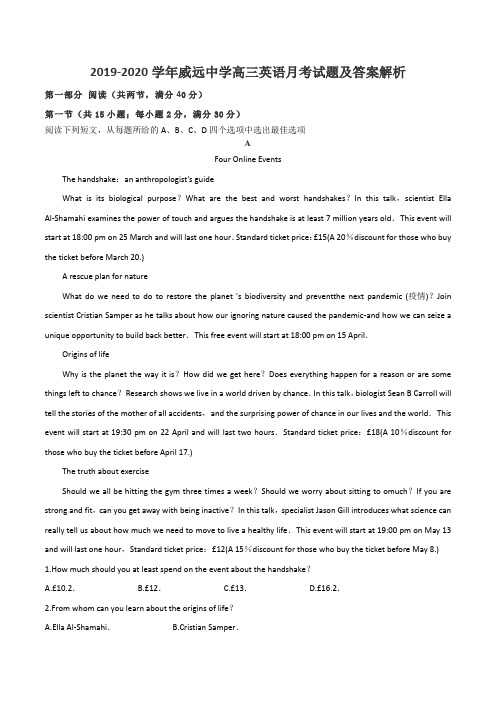
2019-2020学年威远中学高三英语月考试题及答案解析第一部分阅读(共两节,满分40分)第一节(共15小题;每小题2分,满分30分)阅读下列短文,从每题所给的A、B、C、D四个选项中选出最佳选项AFour Online EventsThe handshake:an anthropologist’s guideWhat is its biological purpose?What are the best and worst handshakes?In this talk,scientist Ella Al-Shamahi examines the power of touch and argues the handshake is at least 7 million years old.This event will start at 18:00 pm on 25 March and will last one hour.Standard ticket price:£15(A 20%discount for those who buy the ticket before March 20.)A rescue plan for natureWhat do we need to do to restore the planet 's biodiversity and preventthe next pandemic (疫情)?Join scientist Cristian Samper as he talks about how our ignoring nature caused the pandemic-and how we can seize a unique opportunity to build back better.This free event will start at 18:00 pm on 15 April.Origins of lifeWhy is the planet the way it is?How did we get here?Does everything happen for a reason or are some things left to chance?Research shows we live in a world driven by chance.In this talk,biologist Sean B Carroll will tell the stories of the mother of all accidents,and the surprising power of chance in our lives and the world.This event will start at 19:30 pm on 22 April and will last two hours.Standard ticket price:£18(A 10%discount for those who buy the ticket before April 17.)The truth about exerciseShould we all be hitting the gym three times a week?Should we worry about sitting to omuch?If you are strong and fit,can you get away with being inactive?In this talk,specialist Jason Gill introduces what science can really tell us about how much we need to move to live a healthy life.This event will start at 19:00 pm on May 13 and will last one hour,Standard ticket price:£12(A 15%discount for those who buy the ticket before May 8.)1.How much should you at least spend on the event about the handshake?A.£10.2.B.£12.C.£13.D.£16.2.2.From whom can you learn about the origins of life?A.Ella Al-Shamahi.B.Cristian Samper.C.Sean B Carroll.D.Jason Gill.3.What does the four online talks have in common?A.They are science-based.B.They are about cultures.C.They are related to nature.D.They are intended for the young.BIn Japan many workers for large corporations have a guarantee of lifetime employment. They will not be laid off during recessions or when the tasks they perform are taken over by robots. To some observers, this is capitalism at its best, because workers are treated as people not things. Others see it as necessarily inefficient and believe it cannot continue if Japan is to remain competitive with foreign corporations more concerned about profits and less concerned about people.Defenders of the system argue that those who call it inefficient do not understand how it really works. In the first place not every Japanese worker has the guarantee of a lifetime job. The lifetime employment system includes only “regular employees.” Many employees do not fall into this category, including all women. All businesses have many part time and temporary employees. These workers are hired and laid off during the course of the business cycle just as employees in the United States are. These “irregular workers” make up about 10 percent of the nonagricultural work force. Additionally, Japanese firms maintain some flexibility through the extensive use of subcontractors. This practice is much more common in Japan than in the United States.The use of both subcontractors and temporary workers has increased markedly in Japan since the 1974-1975 recession. All this leads some people to argue that the Japanese system really is not all that different from the American system. During recessions Japanese corporations lay off temporary workers and give less business to subcontractors. In the United States, corporations lay off those workers with the least working experience. The difference then is probably less than the term “lifetime employment” suggests, but there still is a difference. And this difference cannot be understood without looking at the values of Japanese society. The relationship between employer and employee cannot be explained in purely contractual terms. Firms hold on to the employees and that employees stay with one firm. There are also practical reasons for not jumping from job to job. Most retirement benefits come from the employer. Changing jobs means losing these benefits. Also, teamwork is an essential part of Japanese production. Moving to a new firm means adapting to a different team and at least temporarily, lower productivity and lower pay.4. According to the passage, a woman in Japan _________.A. cannot get a lifetime jobB. is impossible to get a part time jobC. will be employed for lifeD. is among the regular workers5. Which of the following is NOT the reason why Japanese workers stay with one firm?A. They don’t want to lose their retirement benefits.B. They are not adaptable people.C. Any change of jobs will make them less paid.D. They get used to the teamwork.6. It can be inferred from the passage that _________.A. those who want to change jobs frequently in Japan should think twiceB. those who are first laid off by American corporations are temporary workersC. the use of subcontractors makes Japanese firms less flexibleD. the Japanese system is totally different from the American system7. What does the passage mainly discuss?A. The extremely hard situation during recessions.B. The extensive use of subcontractors in Japan.C. The characteristics of corporations in the United States.D. The features of lifetime employment in Japan.CAmerica---that glorious symbol of multiculturalism, the great melting pot---qualifies as part of the developed world, right? Not quite, if we consider the state of second language learning in schools across the country. According to a 2018 study, Europe often tops the U.S. in foreign language education in school. 92% of European students are learning a foreign language in school. In America it’s only 20%. In more than 20 European countries, studying a foreign language for at least one year is compulsory. In comparison, only 10 states and D.C. require learning a foreign language for graduation.I went to a public school in Pennsylvania that ranked onNewsweek’s list of America’s top high schools in 2015. Foreign language learning was not a graduation requirement. A common response to such stories and statistics is: So what? Why should Americans care about learning another language when English has recently seemed to dominate as the official language of the world?The world is globalizing faster than we can imagine. More than half of the world’s population speaks more than one language. It is also increasingly becoming the need for success in this globalizing world. Having the ability to speak a second language opens up the possibility of travelling and immersing yourself in another part of the world. This means people can feel other cultures, and traditions in places you were previously kept away because you could not communicate in the language.The teaching of foreign languages can be instrumental in bringing about peace and unity in the country we live in. Learning a second language can be an efficient vehicle to help to bridge communities. To speak another language means having access to a universe of different experiences and world views of another community of people.8. Why does the writer mention Europe?A. America makes studying a foreign language compulsory.B. America is the glorious symbol of multiculturalism.C. America isn’t really qualified as the developed world.D. America doesn’t focus on foreign language education9. What is American’s attitude towards education of foreign languages?A. Less concerned.B. More worried.C. Quite doubtful.D. Very supportive.10. What can visiting people do if they can speak the language where they visit?A. Make the world globalizing.B. Achieve success in business.C. Experience people’s real life there.D. Keep away their own culture.11. What is the main idea of the last paragraph?A. Using a second language can bring harmony.B. Communities of people enjoy the great views.C. Speaking another language is reallynecessary.D. Learning a second language can be difficult.DThermoelectric generators turn waste heat into electricity without producing greenhouse gas emissions, like a free lunch. But the high cost of these devices has prevented their widespread use. Now, researchers have found a way to make cheap thermae-lectrices that work just as well. The work could pave the way for greener car engines, and other energy-generating devices.“This looks like a very smart way to realize high performance,” says Li-Dong Zhao, a materials scientist. He notes there are still a few more steps before these materials can become high-performing. However, he says, “This will be used in the not too far future.”Thermoelectrics are semiconductor devices placed on a hot surface. That gives them a hot side and a cool side. If a device allows the hot side to warm up the cool side, the electricity stops flowing. A device’s success atpreventing this, as well as its ability to conduct electrons, feeds into a score known as the figure of merit, or ZT.Researchers have produced thermoelectric materials with increasing ZTs. The record came in 2014 when Mercouri Kanatzidis came up with a tin selenide with a ZT of 3.1. Yet the material was too fragile to work with. “For practical applications, it’s a non-star-ter,” Kanatzidis says.Getting through that door will still take some time. The tin selenide the team makes is mixed with Na, creating a “p-type” material that conducts positive charges. To make working devices, researchers also need an “n-type” version to conduct negative charges.Zhao’s team is now working on making an n-type version. Once successful, researchers should have a clear path to making a new generation of super-efficient thermoelectric genera-tors. Those could be installed everywhere from automobile exhaust pipes to water heaters and industrial smelters toscavengesome of the 65% of fossil fuel energy that winds up as waste heat.12. The first paragraph wants to tell us________.A. The wide use of thermoelectric generatorsB. The devices of current thermoelectric generatorsC. The reason why researchers make cheap thermoelectricsD. The greener car engines that contribute to environmental protection13. How does Li-Dong Zhao feel about cheap thermoelectric generators?A. Indifferent.B. Optimistic.C. Critical.D. Worried.14. What do you know about the research in 2014 from paragraph 4 and 5?A. It was far from a success for practical applications.B. A tin selenide with a ZT of 3.1 can be easy to work with.C. Researchers made an “n-type” version to make working devicesD. A “p-type” material made from the tin selenide conducts negative charges15. What does the underlined word “scavenge” in the last paragraph mean?A. Recycle.B. Produce.C. Clean.D. Increase.第二节(共5小题;每小题2分,满分10分)阅读下面短文,从短文后的选项中选出可以填入空白处的最佳选项。
四川省威远中学2019_2020学年高二英语上学期第二次月考试题
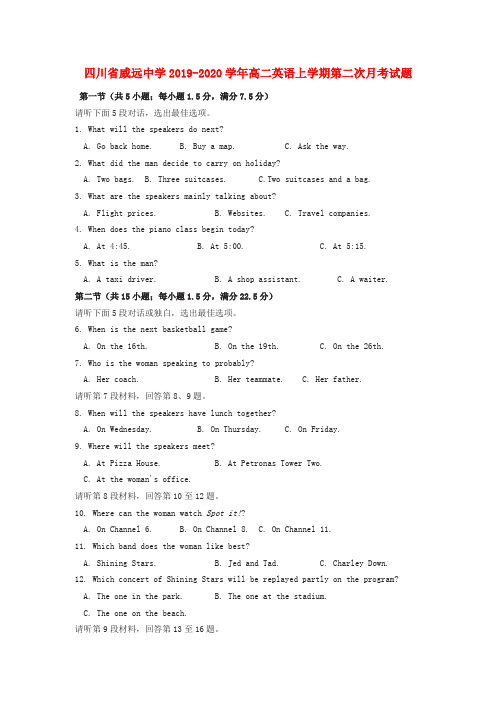
四川省威远中学2019-2020学年高二英语上学期第二次月考试题第一节(共5小题;每小题1.5分,满分7.5分)请听下面5段对话,选出最佳选项。
1. What will the speakers do next?A. Go back home.B. Buy a map.C. Ask the way.2. What did the man decide to carry on holiday?A. Two bags.B. Three suitcases.C.Two suitcases and a bag.3. What are the speakers mainly talking about?A. Flight prices.B. Websites.C. Travel companies.4. When does the piano class begin today?A. At 4:45.B. At 5:00.C. At 5:15.5. What is the man?A. A taxi driver.B. A shop assistant.C. A waiter.第二节(共15小题;每小题1.5分,满分22.5分)请听下面5段对话或独白,选出最佳选项。
6. When is the next basketball game?A. On the 16th.B. On the 19th.C. On the 26th.7. Who is the woman speaking to probably?A. Her coach.B. Her teammate.C. Her father.请听第7段材料,回答第8、9题。
8. When will the speakers have lunch together?A. On Wednesday.B. On Thursday.C. On Friday.9. Where will the speakers meet?A. At Pizza House.B. At Petronas Tower Two.C. At the woman's office.请听第8段材料,回答第10至12题。
四川省内江市威远县高三上学期9月月考——英语(英语)
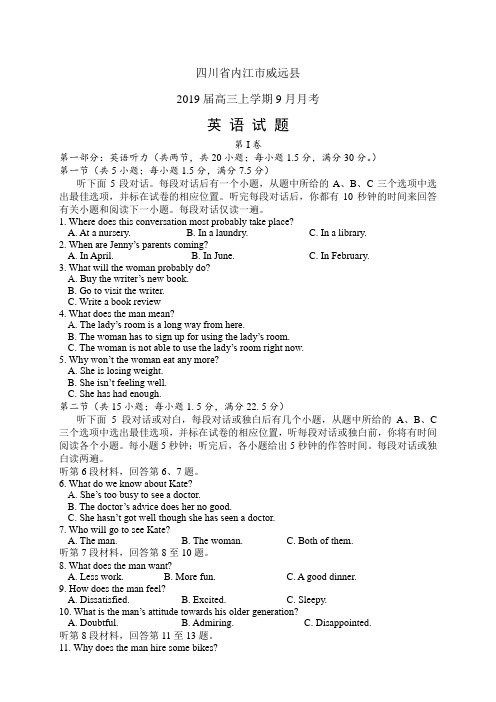
四川省内江市威远县2019届高三上学期9月月考英语试题第I卷第一部分:英语听力(共两节,共20小题;每小题1.5分,满分30分。
)第一节(共5小题;每小题1.5分,满分7.5分)听下面5段对话。
每段对话后有一个小题,从题中所给的A、B、C三个选项中选出最佳选项,并标在试卷的相应位置。
听完每段对话后,你都有10秒钟的时间来回答有关小题和阅读下一小题。
每段对话仅读一遍。
1. Where does this conversation most probably take place?A. At a nursery.B. In a laundry.C. In a library.2. When are Jenny’s parents coming?A. In April.B. In June.C. In February.3. What will the woman probably do?A. Buy the writer’s new book.B. Go to visit the writer.C. Write a book review4. What does the man mean?A. The lady’s room is a long way from here.B. The woman has to sign up for using the lady’s room.C. The woman is not able to use the lady’s room right now.5. Why won’t the woman eat any more?A. She is losing weight.B. She isn’t feeling well.C. She has had enough.第二节(共15小题;每小题1. 5分,满分22. 5分)听下面5段对话或对白,每段对话或独白后有几个小题,从题中所给的A、B、C 三个选项中选出最佳选项,并标在试卷的相应位置,听每段对话或独白前,你将有时间阅读各个小题。
四川省内江市威远县2019届高三英语上学期9月月考试题20-含答案 师生通用
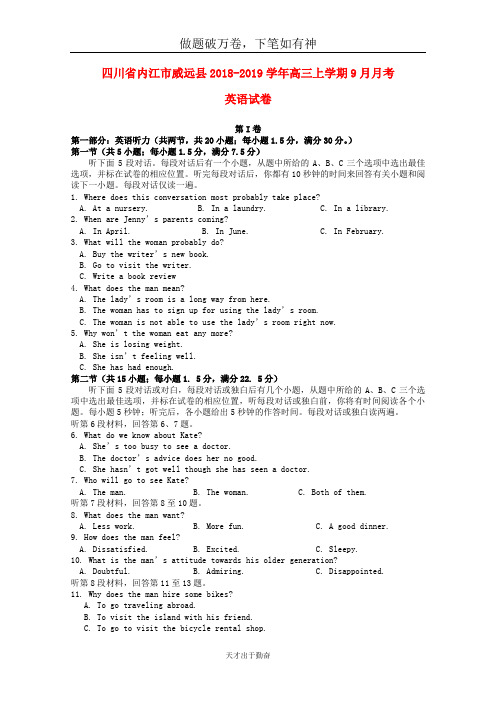
四川省内江市威远县2018-2019学年高三上学期9月月考英语试卷第I卷第一部分:英语听力(共两节,共20小题;每小题1.5分,满分30分。
)第一节(共5小题;每小题1.5分,满分7.5分)听下面5段对话。
每段对话后有一个小题,从题中所给的A、B、C三个选项中选出最佳选项,并标在试卷的相应位置。
听完每段对话后,你都有10秒钟的时间来回答有关小题和阅读下一小题。
每段对话仅读一遍。
1. Where does this conversation most probably take place?A. At a nursery.B. In a laundry.C. In a library.2. When are Jenny’s parents coming?A. In April.B. In June.C. In February.3. What will the woman probably do?A. Buy the writer’s new book.B. Go to visit the writer.C. Write a book review4. What does the man mean?A. The lady’s room is a long way from here.B. The woman has to sign up for using the lady’s room.C. The woman is not able to use the lady’s room right now.5. Why won’t the woman eat any more?A. She is losing weight.B. She isn’t feeling well.C. She has had enough.第二节(共15小题;每小题1. 5分,满分22. 5分)听下面5段对话或对白,每段对话或独白后有几个小题,从题中所给的A、B、C三个选项中选出最佳选项,并标在试卷的相应位置,听每段对话或独白前,你将有时间阅读各个小题。
- 1、下载文档前请自行甄别文档内容的完整性,平台不提供额外的编辑、内容补充、找答案等附加服务。
- 2、"仅部分预览"的文档,不可在线预览部分如存在完整性等问题,可反馈申请退款(可完整预览的文档不适用该条件!)。
- 3、如文档侵犯您的权益,请联系客服反馈,我们会尽快为您处理(人工客服工作时间:9:00-18:30)。
四川省威远中学2019届高三英语上学期第二次月考试题第一部分:听力(共两节,满分30分)第一节(共5小题;每小题1.5分,满分7.5分)请听下面5段对话,选出最佳选项。
1. How will the woman get to the interview?A. By car.B. By taxi.C. By subway.2. Why does the woman suggest the shirt with long sleeves?A. It's comfortable.B. It's lovely.C. It's warm.3. What are the speakers talking about?A. The man's hobby.B. The man's holiday.C. The man's childhood.4. What will the man do this evening?A. See a film.B. Go to a concert.C. Go out with friends.5. What will the man lend to the woman?A.A ruler.B.A pair of scissors.C.A piece of string. 第二节(共15小题;每小题1.5分,满分22.5分)请听下面5段对话或独白,选出最佳选项。
请听第6段材料,回答第6、7题。
6. Where is the new comb?A. On a shelf.B. In a drawer.C. In a cupboard.7. What is the woman probably doing?A. Making a list.B. Doing the shopping.C. Tidying the house.请听第7段材料,回答第8、9题。
8. Why did the woman go to college?A. To have a good career.B. To help with her husband.C. To become more helpful to others.9. How does the man probably find the woman's story?A. Inspiring.B. Touching.C. Interesting. 请听第8段材料,回答第10至12题。
10. When was Harvard University named Harvard College?A. In 1636.B. In 1639.C. In 1780.11. How many years older is Yale University than Princeton University?A. Thirty-nine years.B. Forty-five years.C. Fifty-three years.12. Which is the sixth oldest university in the USA?A. New College.B. University of Pennsylvania.C. Columbia University. 请听第9段材料,回答第13至16题。
13. Which hotel is in a rural area?A. The Carlton House.B. The Royal Oak.C. The Imperial.14. What do the Bridge Hotel and the Majestic have in common?A. Both are near the airport.B. Both are in the town centre.C. Both are near the main square.15. What is the biggest advantage of the Imperial?A. It has opened recently.B. It's a five-star hotel.C. It has business functions.16. What is the Majestic going to build?A.A gym.B. An outdoor pool.C. An indoor playground.请听第10段材料,回答第17至20题。
17. When do the dancers need to arrive for the show?A. At 5:00 pm.B. At 6:00 pm.C. At 7:00 pm.18. What does Mrs. Hannah offer to do?A. Prepare the dresses.B. Answer all questions.C. Control the music and lights.19. What color clothes should volunteers wear for the show?A. White.B. Black.C. Red.20. Why does Tina have to stay longer today?A. She came late today.B. She needs to practice more.C. There is a change in her part.第二部分:阅读理解(共两节,满分40分)第一节(共15小题;每小题2分,满分30分)阅读下列短文,从每题所给的A、B、C和D四个选项中,选出最佳选项。
AJewel’s Online Footwear StoreLeather Dress ShoesPrice: $ 120.00Color: Black Leather, Brown Leather, Red Leather, Natural LeatherAverage Rating: 3 out of 5 starsShipping Info: Standard: 7-10 business days/Express: 3-5 daysCustomer Reviews1.★★★★★My favorite shoes! I’ve been to many conferences where my business fellows have told me how much they like my shoes. Just wearing them makes me feel more calm and content in the office. I recommend them to all of my coworkers, and I own a pair of each color.2.★These are the worst shoes I have ever worn! The leather came off after only one week, and everybody thought they were ugly. The bottom of the shoes made everything slippery. My employer fired me because he hated them! From then on, I will only wear Brand X shoes!3.★★★These shoes do exactly what shoes are supposed to do. There isn’t anything toospecial about them. In the morning, I put them on and go about my clay. They look delightful enough, and they are quite durable(耐用的). I will probably buy another pair.4.★★★★These shoes are my most cherished (珍爱的) possession. I met my bride while buying a pair of these shoes. She was the saleswoman at the store I bought them at, and after she sold me three pairs, I asked her for her phone number and we started dating. Soon after that, we were engaged. We are getting married this afternoon, and I couldn’t be happier.21. How many pairs of leather dress shoes do es the first customer own?A. One.B. Two.C. Three.D. Four.22. Which customer gives the fairest and most objective (客观的)view?A. Customer 1.B. Customer 2.C. Customer 3.D. Customer 4.23. Why does the fourth customer like the shoes?A. He got to know his wife while buying them.B. They make him feel more comfortable.C. They make him attractive.D. They are made to last.BMy 7 –year-old daughter Leeny always has her nose in a book. She even took to reading in the car on the long drive to summer camp, which was where she lost the book. This is the first lost library book in my life. My family has always been overeducated, but we were poor. I didn’t own books. I borrowed books. However, my daughters have more books now than I owned my whole childhood, and I knowingly contribute to it by adding to the stacks(堆). So it’s probably my fault that when Leeny realized she had lost the book, she shrugged(耸肩)。
